Have we lost respect? Is a new sensitivity required? Do words matter? These are some of the questions posed by Ricardo Piñero, director of the Institute Core Curriculum, to introduce the workshop "A new sensitivity towards respect. Words matter", which was held on December 11 at the University. "In view of the heated atmosphere caused by the plurality of sensitivities that question the concept of respect in areas such as academia, this workshop will help us financial aid to put things in their place," he ventured.
The meeting provided a space for reflection on respect for important things and words, in a context of vortex in which the University plays a fundamental role. Throughout the morning, two round tables were held with the participation of Ana Calvo, professor of Literary Theory and Comparative Literature at the CEU San Pablo University; Cristina Sánchez, director of the magazine Alfa y Omega; the professors of the School of Philosophy and Letters Pablo Pérez and Alfredo Cruz; Enrique Baquero, professor of the School of Sciences; and the professors of the School of Communication Ana Azurmendi and Mónica Herrero.
Respect, an endangered species?
Respect consists in confirming the existence of the other person for oneself. "I only communicate with someone if from entrance I respect them," Alfredo Cruz detailed during his intervention. "The way to a new sensitivity towards respect is to understand that it is a question of internship and learning". For his part, Pablo Pérez proposed that, rather than rethinking respect, it is necessary to "live it with delicacy, understood as the recognition of third parties. People deserve more than respect, such as our appreciation, admiration and service.
In Ana Azurmendi's opinion, we must learn to respect the term, which serves as a "shield against the defenders of excessive freedom of expression, who make us modulate our way of expressing ourselves, depending on where and with whom we are". Against those frames that reject opposing opinions and thoughts, the professor of Constitutional Law put on the table dialogue as a solution to verbal aggressiveness: "It is common to deal with polarized intelligence, opposing sides and verbal violence that, far from creating room for dialogue, generates fear, encourages aversion or the inhibitory effect in professions such as journalism, where expression is increasingly limited in the face of threats such as cancellation". Indeed, on more theoretical than practical grounds, "there are terms that are more convincing than others, and recognizing them implies a conversation," he said.
A solution to achieve respect
Pablo Pérez, Full Professor of Contemporary History, emphasized the consideration of third parties in order to talk about respect. The interesting thing is to witness these exchanges of ideas at the University, to foster "a mentality of respect, appreciation and service to the people with whom we live and whom we then serve in our profession".
The promotion of respect also makes it possible to consolidate a fairer society, especially when communicating with people who think differently. In this regard, the professor of the CEU San Pablo University, Ana Calvo, advised educating children in values such as empathy, tolerance and courtesy, both in the family and at school. In this search for unity and respect for diversity, "adults must set an example of respect and foster an environment where people feel comfortable, reduce conflicts and encourage positive dialogue and language," she added.
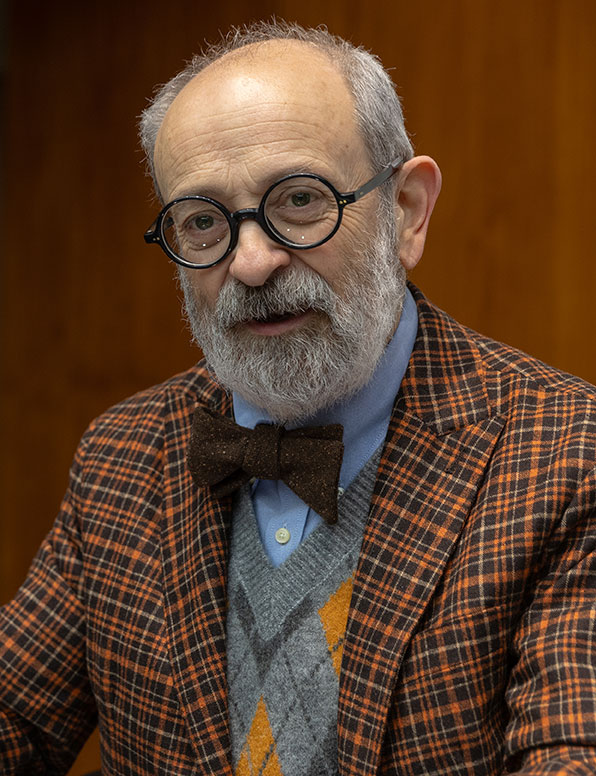
Ricardo Piñero, director of the Institute Core Curriculum. / PHOTO: Manuel Castells.
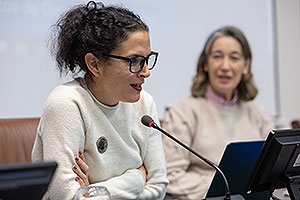
Cristina Sánchez, director of Alfa y Omega/ PHOTO: Manuel Castells.
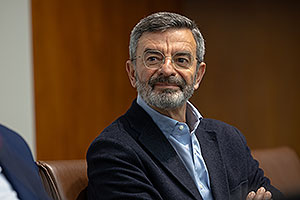
Pablo Pérez, professor at School of Philosophy y Letras. / PHOTO: Manuel Castells.
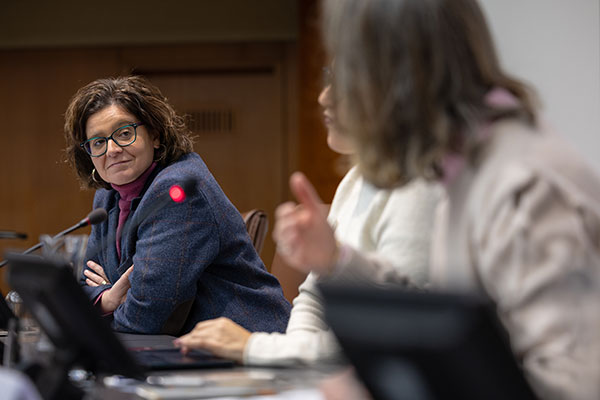
Mónica Herrero, professor at School of Communication. / PHOTO: Manuel Castells.
Back to the origin
"The search for the truth implies making an effort, dedicating hours to compiling data and remaining faithful to it," explained journalist Cristina Sánchez, director of Alfa y Omega, who resorted to the idea of rethinking language in the face of a new narrative in which the journalist begins to lose the protagonism of information while people are at the forefront of it. The vocabulary provides us with facilities such as "getting closer to knowledge and to the truth", he added. The idea of creating community and union through words shows that different languages "do not compete, they cooperate", added Mónica Herrero.
In this line, the Vice President of Communication also made reference letter to how "the spirals of silence reinforce polarization, where people tend to hide their opinion if they think they will be subjected to an isolating pressure". She emphasized the importance of taking into account the context in which we find ourselves to create spaces of understanding and trust, being more explicit.
"The new narratives must continue to respect the basic journalistic code of ethics: fidelity to the truth, to work and to the public vocation and service of the communication professional," continued Cristina Sánchez. In her opinion, the problem lies in the fact that the reality that surrounds us is changing, the new narratives are linked to post-truth and the journalistic code must adapt to this new scenario: "The main thing to avoid disrespecting the profession is to return to the origins of the media, to make it impassable to be untruthful", she said. The lack of respect, he said, triggers a "lack of ethics, language and sensitivity that falls like the pieces of a domino and moves away from journalistic rigor".
Given this approach, Ana Calvo offered her vision on language as a tool of structural and social cohesion, as well as the consideration of the other to "strengthen peaceful coexistence, where the role of language in the media is crucial, since they have a great influence on the way citizens perceive the Public discourse. If the spotlight always ends up falling on conflict and scandal, this focus can contribute to a generalized perception of disrespect," he concluded.
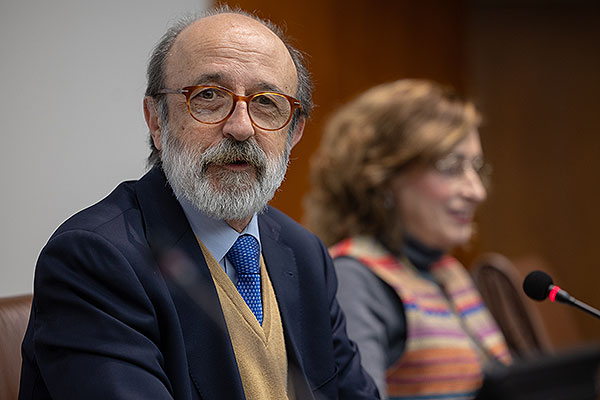
Alfredo Cruz, professor at School of Philosophy y Letras. /PHOTO: Manuel Castells.
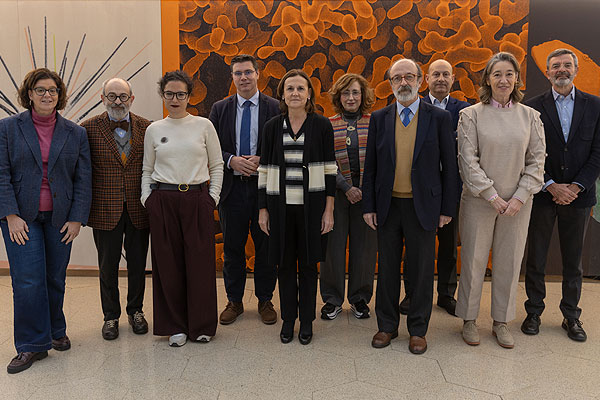
The workshop, organized by the Instuto Core Curriculum, counted with the interventions of Ana Calvo, from the CEU San Pablo University, and Cristina Sánchez, director of the Alfa y Omega magazine, as well as professors from different Schools. / PHOTO: Manuel Castells.
RESPECT, IN FIVE SENTENCES
1

Respect consists in the confirmation of the existence of the other person.
2

Respect implies gentleness and recognition of others.
3

Respect must be protected against verbal aggression and polarization.
4

Language and words play a fundamental role in social cohesion
5


